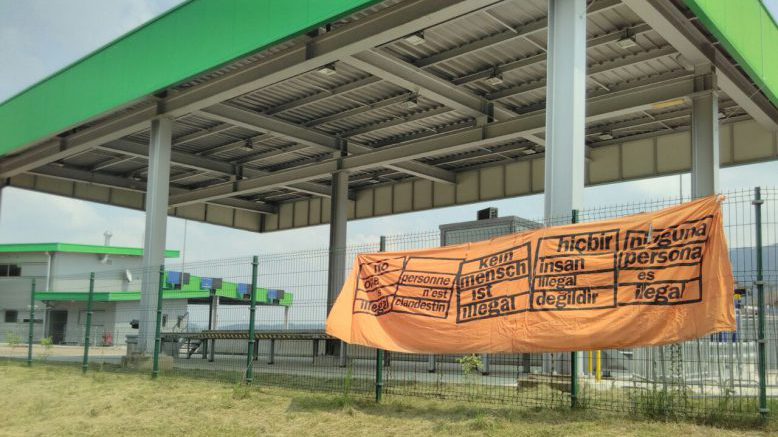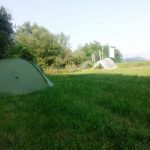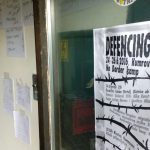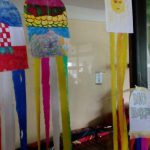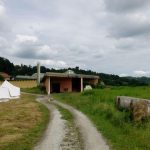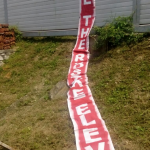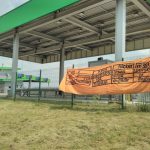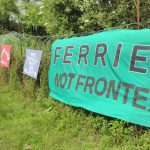Heavy thunderstorms and rain devastated the area so that some of the planned activities were not able to take place. Nonetheless workshops and discussions were held on both the Slovenian and Croatian side of the border. During the final plenaries it was decided to develop stronger transnational solidarity structures and to support local migrant struggles and movements along the countries of transit and reception.
- Razor-wire separating gardens
- Programme and announcements
- Partisan „Bridge of Brotherhood and Unity“ now divided by razor-wire
- ’no-border‘-kites
- The venue on the Croatian side
Update: Around 400 people have gathered today at the Slovenian-Croatian border to spend the day on both side of the separating fence. There will be around 20 workshops on transborder solidarity projects, concrete action proposals, discussions and artistic offers. In the night there will be a „pic-nic of friendship“ on a bridge that once connected local communities, now separated by the fence.
- Free the #Roszke11!
- The close-by border crossing
- Slovenian border fence
This weekend, 24-26th June, a group of transnational and local activists meet at the Slovenian-Croatian border in the towns of Kumrovec and Bistrica ob Sotli and established a protest camp. On the one hand it is a sign in protest of the fence which separates the two countries. On the other hand the action weekend denounces the wider European border regime and the violence it entails.
On this page we will report on the events and happenings of the weekend.
Although there are currently little signs of people moving through this region, only a few months ago many people – fleeing from war and seeking better lives – made their way to central Europe across this border. Back then, migrants crossing through the Balkans were able to use the state-sanctioned Balkan corridor, a safe passage from Greece to central Europe. In reaction to the powerful movement of people, states along the route re-established control over their national borders. The fence on this border was followed swiftly by the re-bordering by other states. In this sense, this fence has to be understood as a wider sign of the progressive closure of the Balkan corridor. The result of the closure is the rendering of migrants into invisible and criminalised subjects. The onwards travel on the Balkan Route is now entailing a risk for their lives and well being. The construction of the fence went hand in hand with the strengthening of the EU’s external borders, which takes form in racist and inhuman agreements with non-EU countries such as Turkey and other similar border externalisation deals in Northern Africa.
This action weekend includes two camps on both side of the border with joint activities and meetings to highlight the violence of this border-regime, which continues to be a physical obstacle for many people on the move. The spot chosen for the weekend is a place where communities on either side have historically worked together and fought against the enforced separations. The presence of transnational activists here shows that in the face of rising nationalism in Europe, another Europe can be imagined. It demonstrates the creation of transborder solidarities at sites of separation.

